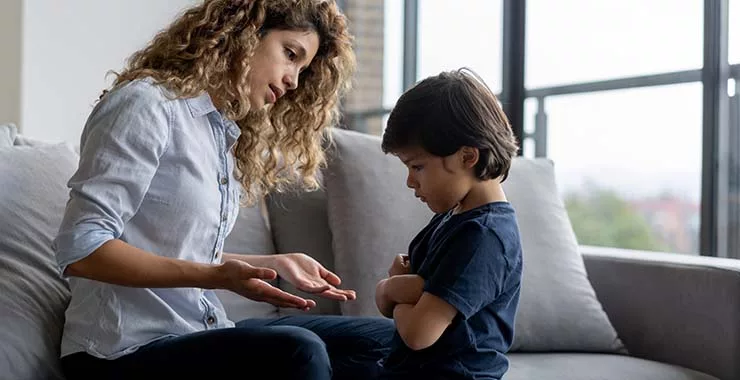Anxiety is a part of the human journey although sometimes the term “anxiety” can be watered down. People have worries such as financial security, job stability, personal relationships, parenting responsibilities and health and safety concerns that occupy their minds daily. However not all concerns can be classified as anxiety.
Anxiety disorders encompass conditions characterized by fear and anxiety that disrupt ones overall well being. In children this anxiety might affect their school attendance ability to make friends quality of sleep at night or concentration in class. Among adults it can impact areas like work performance, romantic relationships, social interactions, financial matters and physical health. Anxiety manifests in ways – physically, emotionally and behaviorally – with several conditions falling under the category of “anxiety disorders.”
A common question asked by parents is whether their own anxiety could cause anxiety in their children. Research indicates a component to anxiety. Genetic studies have found heritability rates ranging from 30% to 67%, for anxiety disorders. If a child has a relative who has been diagnosed with an anxiety disorder it increases the likelihood that the child will experience anxiety throughout his or her lifetime.
Another important query is whether anxiety is contagious. Enough it’s not solely determined by genetics alone.
The relationship between parents and their children can affect each others anxiety levels when they live together. A study published in the American Journal of Psychiatry examined 900 families with twins as parents to understand how environmental factors contribute to anxiety. The findings strongly support the notion that anxiety can be passed down from parent to child through the environment regardless of factors. Moreover the research suggests that anxiety traits can be learned and a childs anxiety can intensify a parents feelings of anxiousness. However there is an aspect, to this; parents have the ability to proactively reduce their childs anxiety by adjusting their own reactions and demonstrating resilient coping strategies.
Anxious Talk
Children have a knack for eavesdropping at the inconvenient moments. You can repeat instructions times and receive no response but its fascinating how they manage to tune in just when you least expect it especially during conversations meant for adults only.
It’s crucial to have a listener when discussing worrisome thoughts but we must be mindful that children often fill in the gaps when they catch snippets of unsettling news. While its beneficial for adults to openly talk about fears like school shootings we need to be cautious about broaching such topics, around children as it could heighten their anxiety.
Children tend to absorb their parents concerns. Might internalize these fearful narratives.
Avoidance Patterns
When we encounter fears our natural instinct is often to avoid them. We tend to justify this avoidance by referring to the root cause of our fear. For instance if you had a childhood experience where you were bitten by a dog it’s understandable that you might consider dogs as unpredictable. Such reactions based on trauma are quite common. However one downside is that children can pick up on these patterns and start believing that all dogs are threats and should be avoided.
Dealing with phobias requires patience and effort. To prevent passing these fears onto your children it’s important to work with your partner or another trusted adult. This way you can ensure that your children have experiences when they encounter your triggers. For example if you have a fear of dogs your partner could introduce your children to animals at an adoption event helping them overcome any concerns, about unpredictability.
Protective behaviors
Some parental practices that promote anxiety include actions designed to shield children from possible dangers. For example, constantly telling children to stop playing or setting limits on how high they can play are examples of overprotection. The underlying message is clear: Play is dangerous and can lead to injury.
Children benefit from experiencing calculated risks so that they can assess their limits and make good decisions. Overprotecting them from imagined threats can inadvertently foster a risk-averse mindset.
By taking the following steps, parents can reduce the environmental transmission of anxious behaviors:
How to Avoid Passing on Anxiety
It can be beneficial to keep a record of the things that tend to make you feel anxious. This way you can better understand what triggers your anxiety and figure out where you might need some support. Anxiety can stem from fears, as well as certain places or situations high levels of stress or interactions, with people.
Whenever you find yourself feeling anxious take a moment to jot down the events that took place the time it occurred and any thoughts or actions that preceded the onset of your anxiety symptoms. By identifying patterns in these instances you’ll be able to pinpoint your trigger points more effectively.
Encourage positive challenges
When we encourage children to push themselves and independently assess their strengths and weaknesses they discover ways to flourish in life. If you feel anxious watching your child climb a rock wall consider inviting a companion to the playground and taking a walk when anxiety strikes. If mingling in gatherings poses a challenge but you want your children to adapt to group settings consider letting them attend parties alone or with your partner or another caregiver.
Motivating children is crucial for them to take on fulfilling challenges. While you may not be able to join them on thrilling rides it’s essential to provide them with opportunities to experience these adventures.
Talking about healthy coping skills
We all go through moments of anxiety. Growing up can be challenging at times. It’s not always easy. When parents show us effective ways to manage and deal with stress we learn that we have the ability to handle our own triggers. Here are some techniques that can help:
- Practice breathing exercises; Inhale for four counts hold for four counts and exhale for four counts.
- Try using an app to relax and unwind.
- Learn progressive muscle relaxation techniques to release tension in your muscles.
- Take a walk together as a family.
- Consider keeping a journal to express your thoughts and emotions.
- Create a container where the family can share their worries or anxieties.
Anxiety has the potential to impact aspects of our lives such as academics, work, health and relationships with others. By recognizing our triggers and finding coping strategies we not only break free, from anxious thoughts but also empower children with the belief that they can successfully navigate the challenges that come with personal growth.
Mark Willson, holding a Ph.D., functions as a psychotherapist in Washington, D.C. His specialized fields encompass addiction, anxiety, depression, as well as sexuality and interpersonal connections. Dr. Willson holds the distinction of being a diplomat for the American Board of Addiction and Anxiety, further serving as a certified counselor and addiction specialist.
Aside from his personal professional endeavors, Dr. Wilson has engaged in roles as an author, journalist, and creator within substantial medical documentary projects.




